What is NHS Continuing Healthcare funding, and can all people receiving care apply?
NHS Continuing Healthcare funding is funding from the NHS for somebody who has what is known as a primary healthcare need. Only people with a primary healthcare need are eligible. Not all people will be eligible, but anybody can apply, those who are definitely not going to be eligible can be screened out of the process using an NHS Continuing Healthcare checklist. If the checklist stage is passed, then the NHS carry out a full Decision Support Tool or ‘DST’ assessment and the NHS nurse assessors and social worker make a recommendation. They are what is known as the multi-disciplinary team or ‘MDT’ and they make a recommendation to the CCG, the Clinical Commissioning Group and the decision will be based on the recommendation.
What happens next if I am found eligible for NHS Continuing Healthcare funding?
Once a decision support tool assessment meeting (DST) has taken place, a recommendation is made by the multi disciplinary team (MDT). This recommendation is then considered by the clinical commissioning group (CCG) and the decision will be forthcoming based on this recommendation. This can take between a couple of days to 28 days to receive the decision letter in writing. If the decision is positive and funding is agreed, health will then meet the care fees, whether that is in a residential home, in a nursing home, or in the client’s own home. Continuing Healthcare funding cannot be supplemented and therefore, it must meet the total care needs of the eligible person.
What is the NHS Continuing Healthcare checklist?
An initial stage of the NHS Continuing Healthcare process is for a checklist to be completed. This is based on a full assessment in that there are 11 domains, however, the levels are based on A’s, B’s and C’s rather than low to severe. In this case, A’s are high and C’s are low. It is far easier to pass a checklist then it is to pass a full assessment, however, once you have a positive checklist, this will lead to a full CHC assessment taking place.
Is it perceived as difficult to receive NHS Continuing Healthcare funding? And if so, why?
It is absolutely incredibly difficult to receive NHS Continuing Healthcare eligibility because the NHS framework guidance and the Decision Support Tool are extremely subjective. Unfortunately, the leading case of ‘Coughlan’ can also be interpreted in various ways and this has made it very difficult to be able to obtain funding from the NHS, which is free at source and non-contributory. It is not impossible however; you just need to know the law and to be able to argue the appropriate points with the CCGs.
What can you do if you do not agree with the decision made that your loved one is not deemed eligible for NHS Continuing Healthcare?
If a Decision Support Tool assessment has taken place and the CCG has made a decision that your relative is not eligible, you can lodge an appeal with the CCG. At first stage a local resolution appeal meeting is held, where you attend a meeting with the CCG and discuss why you think your relative should be eligible for NHS Continuing Healthcare. This can be time-consuming and take around two months to complete. If you are still unsuccessful at the local appeal stage, then you can make a further appeal which is known as an Independent Review Panel (IRP) request to NHS England. An independent panel will be put together by the NHS who will then hear what you have to say on why you think the CCG have got it wrong and the IRP will then make a decision which could overturn the CCG’s decision on eligibility. This is not a quick process and NHS England is inundated with work and you can be waiting for six months or longer to be able to get a date for an IRP.
Who funds the cost of care if it is required but cannot be afforded and is not considered as eligible for NHS Continuing Healthcare?
If somebody has capital of over £23,250 they are considered by social care as a self-funder and would be expected to fund their own care. If somebody had between £14,250 and £23,250 they would receive some help from social services, who would do a financial assessment and they will take into account income and capital. People are expected to make a contribution from their income and if it is residential care that could be the majority of their income. If it is home care, then there is a slightly different calculation, however if there are savings between £14,250 and £23,250 people will be making a contribution from both their income and capital. If you own the property you live in, the property is disregarded in a financial assessment if you receive care at home. If you are moving into a care home, the property can be disregarded if you have spouse or a partner living in the property, or for a small number of other reasons. If none of these reasons apply and there is no discretionary disregard, the property may have to be sold to pay for your care.
If NHS Continuing Healthcare has been provided, how does the timescale apply? Will the individual always be eligible? What if the individual was eligible prior to the assessment?
Well, when someone has an NHS Continuing Healthcare checklist assessment, the NHS has 28 days in which to complete a full Continuing Healthcare assessment and make a decision. If the decision is that the individual is eligible, the funding will be dated to either 28 days from the date of the checklist or if a checklist was not carried out it will commence on the date the assessment took place. However, if somebody thinks they might have been eligible prior to that assessment and there has been no previous assessment, regardless of whether that person is alive or has passed away, a claim for a previously unassessed period of care can be carried out and then the NHS go back and look at the whole period which at this moment in time can go back as far as April 2013.
What happens if NHS Continuing Healthcare funding is withdrawn?
NHS Continuing Healthcare funding cannot be withdrawn without a full continuing healthcare assessment taking place. There must be input from the patient or the patient’s family as a part of the assessment process. If the outcome is negative, the appeal’s procedure can be commenced.



